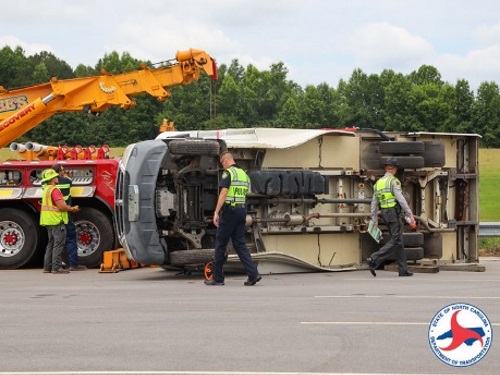The North Carolina Department of Transportation recently joined the North Carolina State Highway Patrol on June 23 to open a new Traffic Incident Management Training and Development Track in Raleigh, NC – a closed half-mile course that helps first responders safely train for emergency events that occur on highways statewide every day.
[Above photo by the NCDOT]
The track has been in operation during the COVID-19 pandemic, NCDOT noted. This is the first opportunity to celebrate facility’s opening officially and in person.

Following the ribbon-cutting ceremony, attendees experienced a multi-agency demonstration or emergency road-clearing scenarios involving single and multiple vehicles – including both passenger cars and commercial vehicles.
NCDOT Secretary Eric Boyette noted in a statement that the state’s Incident Management Assistance Program or IMAP originally got its start back in the 1960s, with roadside assistance provided along 21 miles of interstate through the Pigeon River Gorge. Over time, the program expanded to cover more than 850 miles of highway in North Carolina.
“This grand opening is a testament to the strong partnership we have shared between our agencies over the years,” noted Colonel Freddy Johnson, Jr., of the North Carolina State Highway Patrol. “I am appreciative for our work together and for what we will do as we move forward.”

“NCDOT’s partnership with State Highway Patrol is vital to provide a safe, reliable road network for North Carolinians and our visitors,” added Boyette. “We will continue working together to improve safety on our roadways.”
NCDOT is also engaged in other incident management research as well. For example, in February, the agency began testing a new ‘tethered drone’ system in conjunction with the agency’s highway patrol service to improve safety on North Carolina roadways.
Drones tethered to specific IMAP vehicles could help responders assess incidents, provide situational awareness to NCDOT’s Statewide Transportation Operations Center or STOC and Traffic Management Centers or TMCs, and assist with overall traffic management of the incidents.
 States
States
TxDOT Updates Artificial Intelligence Strategic Plan
February 27, 2026 States
States

